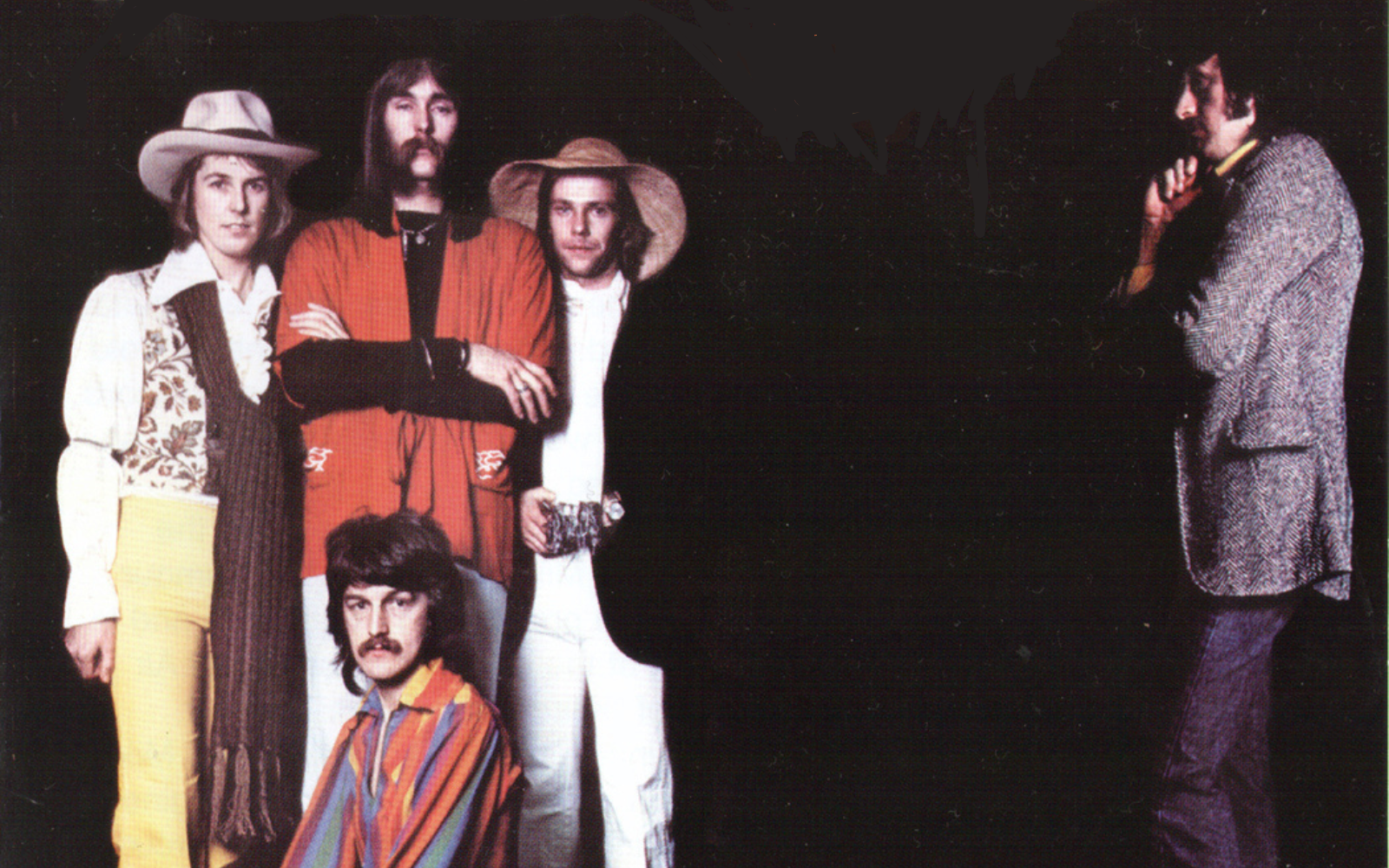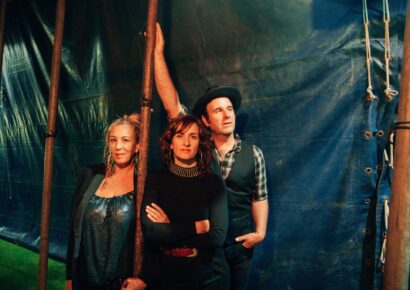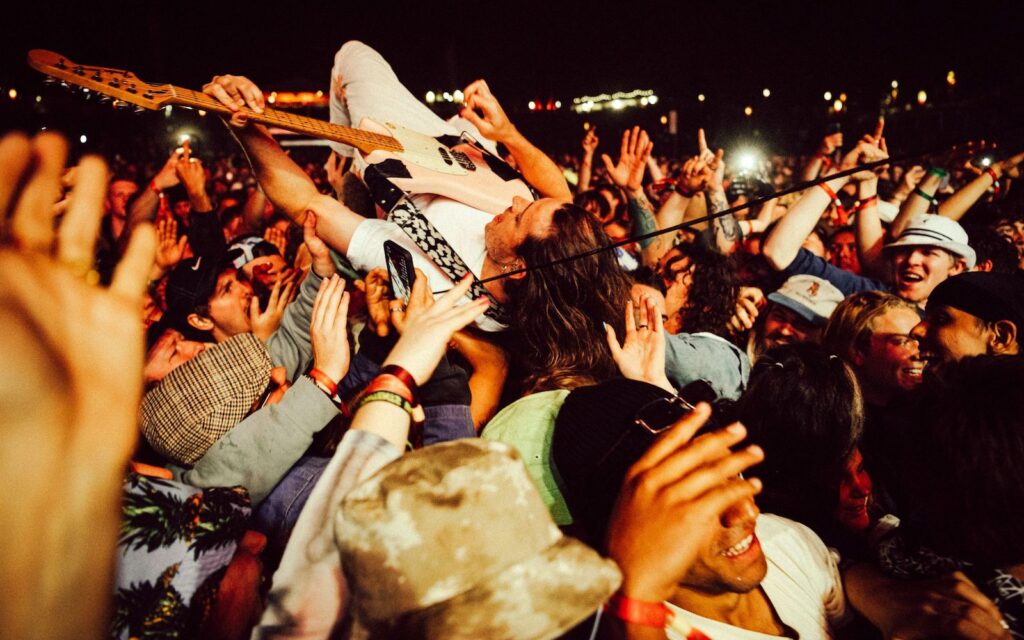Legendary rock band AC/DC probably summed it up best–it really is a long way to the top if you wanna rock and roll.
Thousands of bands and artists have worked Melbourne’s gruelling live music circuit over the last fifty years or so, sometimes playing two or three gigs a day, and crisscrossing town to do so. Most have also spent enormous time and energy writing and recording their music, only to find that rewards and recognition are often not commensurate with effort.
It’s usually not enough just to be excellent at your craft–luck also plays its part. For example, it could be argued that Skyhooks’ meteoric rise to fame, while well-deserved, was greatly assisted by the recent arrival of colour television in Australia and the advent of the ABC’s new one-hour Sunday night music show Countdown. Dressed in ludicrous costumes and caked in garish makeup, the ‘Hooks were made for that show. Plus, they had the comedic duo of lead singer Graham ‘Shirley’ Strachan and guitarist Red Symons to make fun of the show’s bumbling host, Ian ‘Molly’ Meldrum.
While the brilliant Skyhooks were a great example of ‘the right place at the right time’, others were not as fortunate. Whether it was the sound, the look, or a combination of other factors such as bad timing, many deserving bands and artists struggled for widespread acceptance and commercial success.
Who are the most underrated Melbourne bands and artists of the pop/rock era? Here are a few to get us started:
Keep up with the latest music news, features, festivals, interviews and reviews here.
Ariel
Ariel was formed in Melbourne in 1973 by New Zealand-born singer-songwriter and guitarist Mike Rudd and bassist Bill Putt, following the demise of Rudd’s iconic progressive rock band Spectrum. They were joined by their ex-Spectrum bandmate John Mills on keyboards, and two ex-members of Sydney prog-rock band Tamam Shud, Tim Gaze (guitar and vocals) and Nigel Macara (drums).
Although Spectrum had great commercial success and still gets regular airplay with the hit single I’ll Be Gone, which peaked at #4 in May 1971 (Kent Music Report), their brand of progressive rock was generally digressive and musically complex, in the style of early Pink Floyd, and appealed mainly to fans of the underground music scene. Ariel, on the other hand, adopted a more accessible commercial rock sound, mixing blues, rock and country to achieve a harder, pub-rock edge. With this new approach, great success surely awaited?
Not quite. While extremely popular on the live music circuit, Ariel struggled to achieve significant record sales. Its best-selling album was A Strange Fantastic Dream (1973), which reached a peak of #17 on the national charts. Their 1976 album Goodnight Fiona reached #19 in Melbourne in October of that year, while the singles Jamaican Farewell (1973) and I’ll Take You High (1976) reached #66 and #62 respectively (Kent Music Report). Rock historian Ian McFarlane describes Jamaican Farewell as “joyous reggae-rock”, and as usual he is right on the money. The single deserved to sell many more copies but was hampered by a general lack of airplay, particularly in Sydney. Nevertheless, the song was awarded the FARB (Federation of Australian Radio Broadcasters) Single Of The Year in 1973.
Ariel had numerous personnel changes in its four-year history. The original lineup disbanded in April 1974, after which Rudd and Putt were joined by John Lee on drums (Sayla, Blackfeather, Dingoes), and Harvey James on guitar (Sayla, Mississippi). The band left for the UK in October 1974, where two months later they recorded the Rock & Roll Scars album at Abbey Road Studios in London. The album is compelling listening, as the band gives a tougher, pub-rock edge to a clutch of old re‑recorded Spectrum and Ariel songs as well as three new songs. Despite its quality, the album was only a moderate success, reaching #50 in the Australian charts in mid-1975.
After more lineup changes, most notably the departure of Harvey James to join pop chart-toppers Sherbet in 1976, Ariel continued to work the pub circuit and record, releasing the well-crafted singles Disco Dilemna (#82 peak) and It’s Only Love (#62 peak) in 1977 to moderate, disappointing sales.
On 21 August 1977, having decided to disband, they played one last spectacular gig at Dallas Brooke’s Hall in Melbourne. Called “Island Fantasia’’, the concert produced the live albums Aloha Ariel (1977) and Ariel Alive!! – More From Before (1978). Ariel then called it a day.
Phil Para
Phil Para is a New Zealand-born Melbourne guitarist, singer and songwriter whose outstanding blues-rock has been thrilling pub-rock punters for decades. He’s probably best known for his twenty plus years Saturday night residency at the Esplanade Hotel in St Kilda, where he played weekly to full houses, but he has done so much more. There are many excellent blues rock singer/guitarists in Australia, but few to match Phil Para for playing technique, sheer entertainment and stagemanship.
Para plays electric and acoustic guitar with rare flair and skill, paying homage to the greats that have inspired him, such as Jimi Hendrix, Eric Clapton, Carlos Santana and Stevie Ray Vaughan. Eric Burdon has been quoted as saying, “Phil actually becomes Hendrix when he plays one of Jimi’s songs’’. Phil’s shows include classic Hendrix party tricks such as playing the guitar with his teeth and playing it behind his head.
Phil plays an exciting mix of covers and original material, acoustic and electric. He has released one album, the five-song EP Gypsy Night (2018), featuring brilliant and moving acoustic guitar blues. His hard work, professionalism and persistence have built a strong and loyal following mainly on the back of his live performances. He does not have a dedicated website–although he does have a Facebook page–and does not seem particularly interested in the trappings of widespread stardom and huge commercial success. Nevertheless, with his unique talents, he could (should?) be a household name.
Phil Para and his band, including his multi-instrumentalist son Denzil Para, play regular live gigs across Melbourne and beyond. Follow him here.
Stars
Although originally formed in Adelaide in May 1975, Stars relocated to Melbourne in 1976 and spent the rest of their time based in the Victorian capital. Marketed initially as Australia’s “rock and roll cowboys”-a branding which, long term, probably did their image no favours-the band played a unique and catchy blend of original, Australian country-rock/boogie.
The band comprised lead singer Mick Pealing, guitarist and vocalist Malcolm Eastick, drummer Glyn Dowding (replaced in 1978 by John James ‘JJ’ Hackett), and a succession of bassists which began with Graham Thompson and at one stage included the Little River Band’s Roger McLachlan. Their main songwriter was the Adelaide-born singer/guitarist Andrew Durant, who joined the band in August 1976, three months after Star’s first single Quick On The Draw was released and had reached a peak of #46 on the national charts.
Despite extensive touring and recording over their four-and-a-half-year history, the band was never able to achieve the chart success and widespread acclaim of peer bands of the era such as The Dingoes. Their most successful single was the Durant composition Look After Yourself, which charted on 12 December 1977 and reached a peak of #30 on the national charts. Stars’ other singles releases–Quick On The Draw (peaked at #46), With A Winning Hand (#65), Mighty Rock (#47), Back Again (#52), West Is The Way (an excellent country-rock ballad which, incredibly, failed to chart), In And Out Of Love (#52), Land Of Fortune (#93), Wasted Words (failed to chart), and Last of the Riverboats (failed to chart)–achieved undeservedly disappointing sales.
Their debut album Paradise, from which the single Look After Yourself was lifted, was their most successful LP. Released in January 1978, the album peaked at #14 nationally and stayed in the charts for 20 weeks. Their second album Land Of Fortune, released in June 1979, produced four singles but reached a peak of only #35 in July 1979. Following this disappointment, exhausted by the grind of touring, and reeling from the news that Andrew Durant had been diagnosed with cancer, the band split up in early November 1979. Their final, live album 1157–the total number of gigs the band had played during their time together-was released in July 1980 and peaked at #46.
Sadly, Andrew Durant passed away on 6 May 1980, aged only 25. The Andrew Durant Memorial Concert, organised by Mal Eastick in his honour and featuring Stars’ surviving members and a host of industry heavyweights including Jimmy Barnes, Renee Geyer, Brod Smith and Don Walker, resulted in a double live album on which all but three songs were Durant compositions. The album was a great success, peaking at #8 and showcasing Durant’s and Stars’ considerable and underappreciated talents.
Stay tuned for part two soon. In the meantime, read part one of John Phillips’ countdown of the most obscure hit songs in Australian history here.







